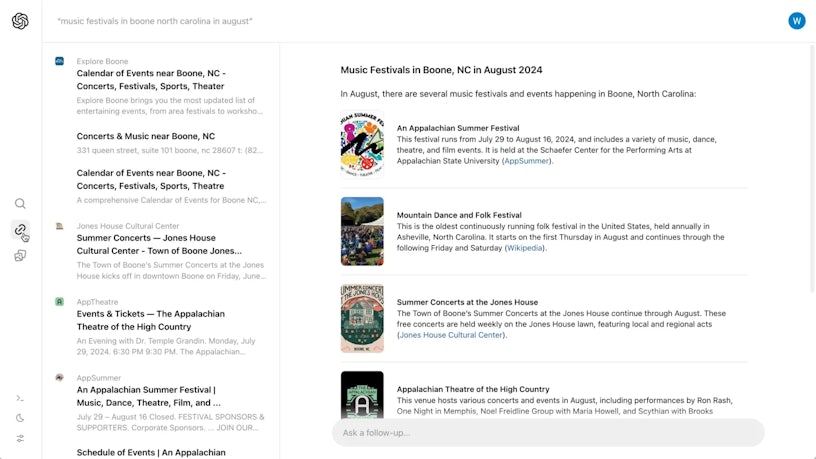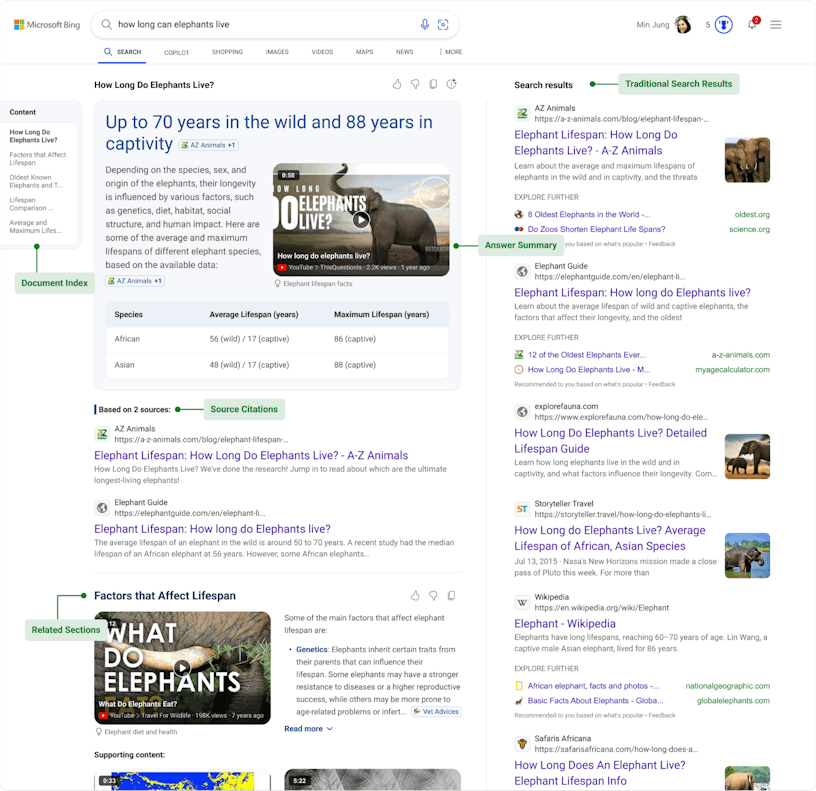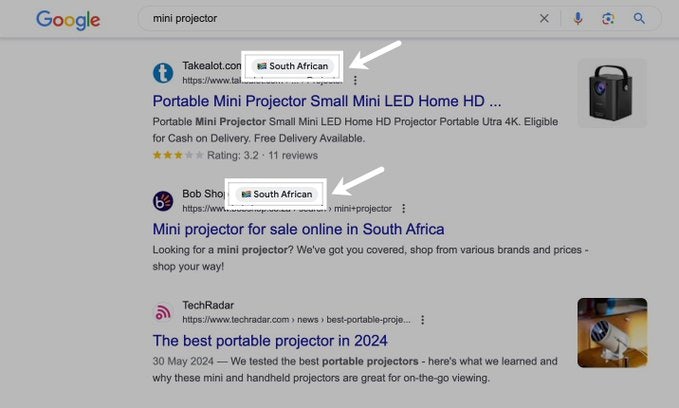This month we bring you some exciting developments and updates from the world of search. From new features to major partnerships, there’s a lot to cover, including the launch of Bing’s generative search experience and an ongoing development from the collaboration between Reddit and Google.
Firstly, Reddit has updated its robots.txt file to block most search engines, except Google, from accessing its content. The company claims this decision follows unsuccessful negotiations with other search engines. However, many SEOs are sceptical of this explanation.
Meanwhile, Bing is following in Google’s footsteps by testing its own generative search experience. Early images reveal that this feature prominently displays AI-generated content alongside traditional organic results. Initial data indicates that this layout may reduce the occurrence of zero-click searches, potentially avoiding the traffic losses associated with similar functions.
Additionally, other exciting developments include the testing of country labels in search engine results pages (SERPs) and the launch of SearchGPT.
We’ll explore these updates and more in detail in the article below.
Allow our traffic light system to guide you to the articles that need your attention, so watch out for Red light updates as they’re major changes that will need you to take action, whereas amber updates may make you think and are definitely worth knowing but aren’t urgent. And finally, green light updates which are great for your SEO and site knowledge but are less significant than others
Keen to know more about any of these changes and what they mean for your SEO? Get in touch or visit our SEO agency page to find out how we can help.
In this post, we’ll explore:
- Reddit is now blocking Bing from crawling their website
- OpenAI has launched SearchGPT
- A closer look at the platform
- Bing has announced a new AI answers interface
- Google's Gemini has added related content and links in its latest update
- New features and improvement highlights
- Faster and smarter responses
- File uploads
- Related content feature
- Inline links
- Double-check feature
- Gemini in Google Messages
- Safety and guidance
- Google will ‘soon’ test search, shopping ads in AI Overviews
- Country-specific SERP labels have been tested in Search
- How does this impact SEO?
On July 1st, Reddit updated its robots.txt file to block most search engines (except Google) and AI crawlers from accessing its content. Reddit claims this decision is not related to its recent partnership with Google. Instead, the company told The Verge that it has been in discussions with multiple search engines but couldn’t reach agreements with all of them, as some were unable or unwilling to make enforceable promises regarding their use of Reddit content, particularly for AI purposes.
However, many are sceptical of this explanation, pointing out that Google pays Reddit $60 million a year to access its content, and Reddit results have become more prominent in search results. This move has sparked concerns about Google promoting monopolies and stifling competition.
OpenAI has announced the launch of a new search product named SearchGPT. It is described as a “temporary prototype” with limited availability to just 10,000 users and publishers at its launch. The company aims to eventually integrate the best features of SearchGPT directly into ChatGPT.
SearchGPT combines OpenAI’s AI models with real-time web information to respond to user queries. It also includes links to relevant sources within its answers, ensuring users have clear references to verify the information provided.
Along with the platform, openAI have also developed a new crawler named OAI-SearchBot, which is specifically for search purposes. This crawler surfaces websites in search results within the SearchGPT prototype. However, it is not used for training OpenAI’s generative AI foundation models. Websites are encouraged to allow OAI-SearchBot via their robots.txt file to ensure their inclusion in search results. More information on their web crawlers can be found in their official documentation.
OpenAI is introducing tools for publishers to manage how their content appears in SearchGPT. This approach provides publishers with more control over their content in search results while maintaining a separation from the data used to train OpenAI’s AI models. Despite this, it is important to note that websites can appear in search results even if they opt out of participating in AI training.
A closer look at the platform
Search Box: The interface begins with a simple search box that prompts users with “What are you searching for?”
- Search Results: After a query is submitted, SearchGPT provides answers integrated with source links. The sources are visibly displayed below the main answer.
- Additional Results: A sidebar presents additional search results, offering more information and options to users.

SearchGPT represents OpenAI’s ambitious step into the search engine landscape, leveraging AI to enhance user experience with rapid, source-backed answers. In the future, OpenAI plans to enhance SearchGPT’s capabilities, especially in areas like local information and commerce-related searches.
At the end of July, Bing announced they had been working on a generative search experience. This new feature means that when a user searches for a query, they will be presented with an AI-generated overview that delves into the topic and provides detailed information.
As part of this experience, the central answer will be AI-generated, and users will have access to a table of contents to navigate through both the AI-generated content and organic search results. Additionally, organic search results will be displayed on the right-hand side, allowing users to continue their search journey seamlessly.
According to Bing, they have tested this interface and early data suggests that this feature maintains the same amount of clicks to websites and avoids a layout that increases zero-click search results. AI’s generative search experience is being slowly rolled out and the search engine is collecting user feedback which will be used to improve the feature in the future.
Gemini, an AI-powered tool designed to enhance productivity, creativity, and curiosity, is receiving a significant upgrade with the release of Gemini 1.5 Flash.
This update will be available in over 40 languages and over 230 countries and territories as it looks to improve speed and response quality and expand language accessibility. It also brings a host of new features across the platform including a mobile app and Gemini for Teens which has been designed to provide educational and creative support.
New features and improvement highlights
Faster and smarter responses
The introduction of Gemini 1.5 Flash aims to provide quicker and higher-quality responses, available now in the free version of Gemini. This update enhances response quality, particularly in reasoning and image understanding.
File uploads
Soon, users will be able to upload files from Google Drive or directly from their device, similar to features available in Gemini Advanced. This functionality will enable users to interact with their content more effectively, such as creating practice questions from study guides or analysing data files for insights and visualisations.
Related content feature
Gemini now includes links to related content within its responses for fact-seeking prompts, helping users explore topics more comprehensively. This feature aims to reduce hallucinations by providing access to additional verified information.
Inline links
For English language prompts in select regions, users can click on links embedded in responses to explore websites and delve deeper into topics. This includes links to relevant emails if the information is sourced using the Gmail extension.
Double-check feature
To strive for accuracy, Gemini uses Google Search to verify its responses, highlighting statements that are corroborated or contradicted on the web. This allows users to further verify information as needed.
Gemini in Google Messages
The ability to chat with Gemini directly in Google Messages is being expanded to the European Economic Area (EEA), the UK, and Switzerland. New languages, including French, Polish, and Spanish, are being added, enhancing accessibility for more users.
Safety and guidance
Gemini is designed with safety and developmental needs in mind and has put additional policies and safeguards in place. This includes a teen-specific onboarding process and an AI literacy guide to promote responsible use of AI. OpenAI has also partnered with child safety experts to ensure the platform meets the unique needs of teens and their families.
Back in May, Google announced that ads would be coming to AI Overviews. Fast forward to now, and although they haven’t been implemented yet, Alphabet’s Senior Vice President, Philipp Schindler, has confirmed that they are coming “soon.”
No specific date was given, but Schindler confirmed that users in the U.S. will soon start to see shopping ads in AI Overviews. These shopping ads will be labelled as ‘sponsored’ and will only appear for relevant queries and when appropriate for the content in the AI Overviews. According to Google/Alphabet’s CEO, Sundar Pichai, early tests suggest that ads appearing above or below AI Overviews are helpful to users.
Advertisers do not need to create separate ads for this; Google will use the existing ads that have already been set up. Google mentioned that these AI-powered recommendation ads will be tested with select advertisers in the U.S. over the coming weeks.
In July, users noticed that Google began providing country labels next to some websites in search results, indicating their geographic location. The purpose of these labels is to show how geographically relevant a site is, helping users determine whether the services or information provided will be useful to them.
This new feature has received mixed responses from those in the industry. Some commentators question its superficiality, while others are more optimistic, suggesting it could improve the user experience and potentially impact click-through rates (CTR). The reasoning is that country labels help users easily identify whether a site is relevant to their country, simplifying their search process.
How does this impact SEO?
If this feature is rolled out globally, it could significantly impact global SEO. Country labels may encourage websites to adopt a more localised approach to ensure relevance to specific markets, thereby increasing the importance of local SEO strategies. It may also allow local businesses to compete more effectively with global players.
To prepare for this potential change, optimise your website for local SEO. This includes ensuring your site indicates its geographical relevance through factors like metadata and on-page content, and keeping your Google My Business page up-to-date and optimised for local search.










